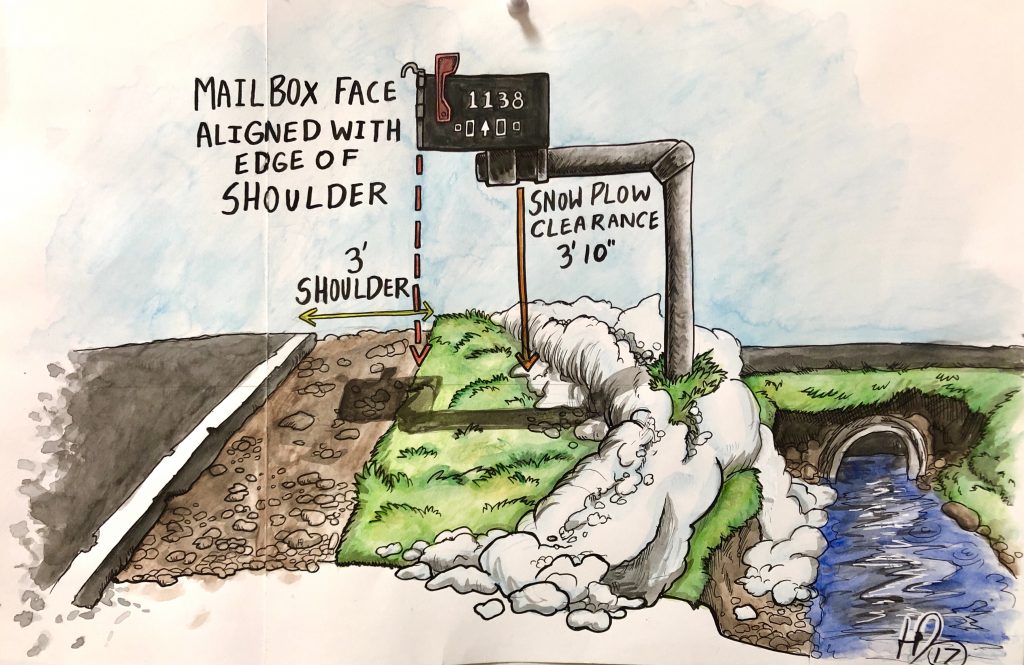Rural Mailbox Guidelines
Specifications:
• When choosing a rural mailbox, ensure it is strong enough to hold the weight of letters and parcels and that it is weatherproof.
• All rectangular mailboxes must have an opening of at least 17.5 cm (7”) in width and height, and an interior of at least 45 cm (18”) in length.
• A cylindrical mailbox must have an opening of at least 25 cm (10“) in diameter and an interior of at least 45 cm (18“) in length.
• The bottom of the box should be at least 100 cm {and preferably 107- 114cm (42”- 45”)} above the ground. It should not obscure or obstruct access to any other boxes near it.
• Mailboxes must have a door located in the front, with a sturdy handle, lip, or flange. They must remain open while mail is being picked up or delivered, and be able to open with ease and close securely.
• The mailbox must be upright and securely attached to a fixed post or an arm on a lever, and must not be allowed to swing freely.
Placement:
• All rural mailboxes must meet Canada Post’s safety criteria so the Corporation can ensure the safety of employees, customers, and motorists.
Clustering:
• Before clustering or grouping mailboxes next to or in front of someone else’s property, approval must be obtained from the owner of that property.
• Approval must be obtained from local post offices to cluster rural mailboxes.
• Clustered mailboxes must be aligned at the same height and in the correct numerical sequence.
Mailboxes must be aligned and evenly distributed along the support. Ideally, the bottom of the mailbox should be 107-114 cm (42”- 45”) above the ground.
• A rural mailbox should be located along the right-hand side of the road in the direction that the delivery agent travels.
• Mailboxes must be placed where the delivery agent can safely deliver the mail through the passenger window without
Signal Device:
• The proper placement and maintenance of rural mailboxes ensure the continued safe delivery of mail by Canada Post. Please consult with your local post office to ensure that all mailbox specifications and road safety criteria are met before installing a rural box. Your Local Postal Official can answer any questions you have about rural mail delivery.
getting out of the vehicle.
• It is the responsibility of mailbox owners to ensure that the location for the rural mailbox is free of underground obstructions such as power, gas and cable lines, water mains, etc.
• Please call your local utility locator service before you dig.
• Delivery vehicles must have sufficient clearance to drive up to the mailbox and then continue
in a forward direction while merging back into traffic.
• Rural mailboxes should never be placed in laneways or driveways.
Identification:
• The civic address of each resident or homeowner should be marked on the right-hand side of a rural mailbox when facing the receptacle from the front.
• In non-civic addressed areas, a resident’s full name should be clearly indicated on the side of the box.
• A resident’s name or address information must be placed on the side of the box so it is clearly visible to the delivery agent as he or she approaches the mailbox.
• Local post offices should be advised of the names and/or businesses that will receive mail at a rural mailbox.
Snow Clearance:
• The area in front of a rural mailbox must be kept clear of snow and ice to ensure uninterrupted delivery of letters and parcels.
• Delivery agents require at least one car length on both sides of a rural mailbox to pull over safely, deliver the mail then safely merge back into traffic.
• A signal device is used by Canada Post delivery agents to indicate
that mail has been deposited in a mailbox for pickup or for customers to indicate that there is outgoing mail to be picked up (proper postage must be affixed to all outgoing mail).
• The signal device should be easily visible from a distance and should not obstruct a name or address on a rural mailbox.
• Signal devices must be on the right-hand side of rural mailboxes when facing the receptacle from the front.
Maintenance:
• Rural mailbox owners are responsible for all costs associated with placing, relocating, and for ongoing maintenance of their mailbox and the surrounding terrain.
• Replacing or reinstalling a mailbox that becomes damaged or knocked down is also the responsibility of the owner.
• Please ensure that, during delivery hours, access to mailboxes remains free of obstructions such as garbage and newspaper receptacles, parked vehicles, etc.
• The area in front of a mailbox must be firm and level to allow safe and easy access for Canada Post delivery vehicles.
• Delivery agents are not required to leave their vehicle while delivering to a rural mailbox and their inability to access a rural mailbox may result in non-delivery.
• Metal mailboxes are prone to rust and should be checked frequently to ensure that they do not pose a risk to Canada Post employees.

